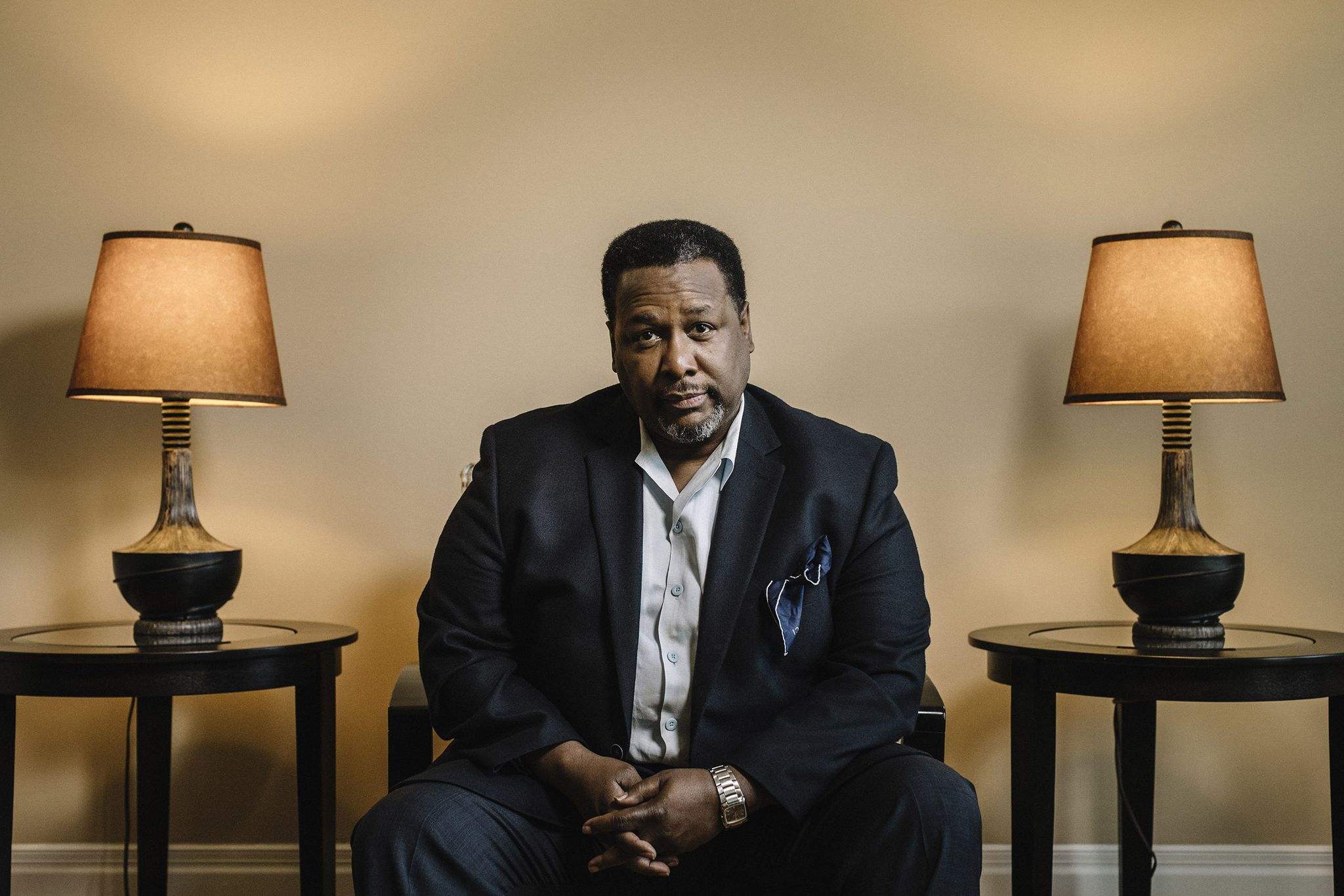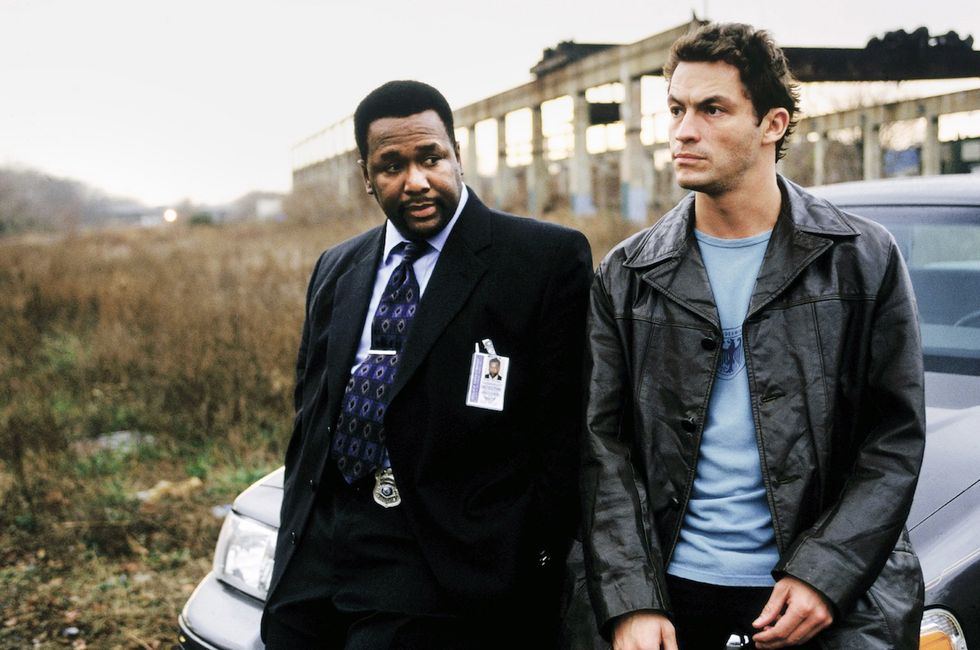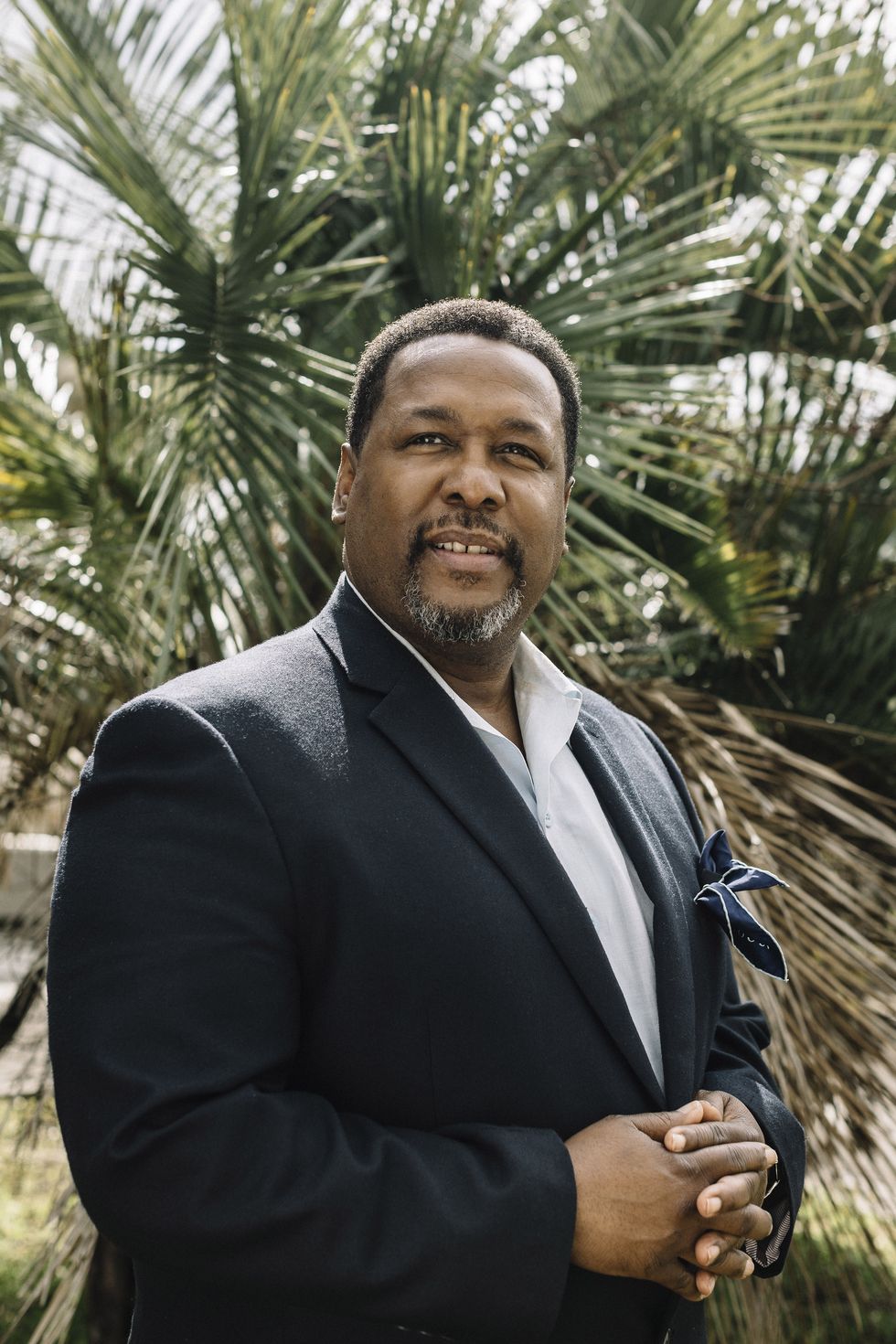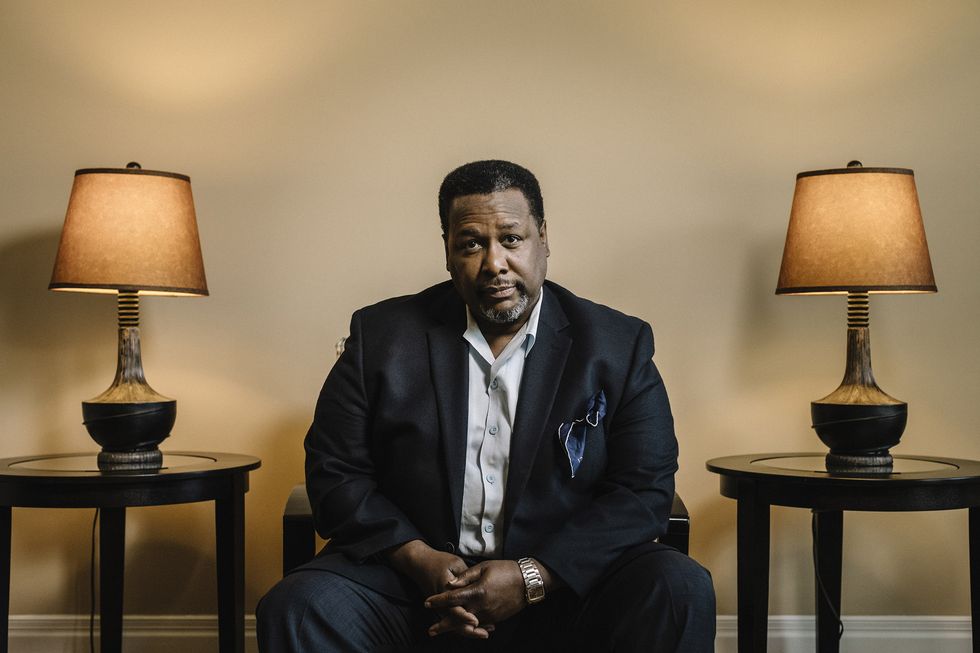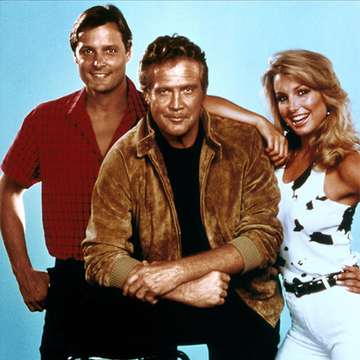A substantial figure of the American stage and screen, most celebrated for his performance as a world-weary homicide detective on the peerless HBO drama The Wire, the actor Wendell Pierce describes himself as “tri-coastal”: he lives between Los Angeles, New York and his native New Orleans. Or, as he puts it in his sonorous basso profundo, “That’s the West Coast, the East Coast and the Gulf Coast.” Dramatic key change for that final Coast, reflecting Pierce’s emphatic pride in the place of his birth.
Typically, perhaps, when I reach him on the phone, Pierce is in none of the three cities he calls home. It’s morning in the Midwest, and the actor is at his hotel, recovering from a night shoot for Chicago PD, a show that is one of a number of his regular gigs. By the time this article is published, he’ll be in yet another city, in rehearsals for what will surely be a highlight of spring’s London theatre season: a revival of Death of a Salesman, at the Young Vic, with Pierce as the play’s tragic anti-hero, Willy Loman.
Famously, Arthur Miller’s ruthless critique of materialism, his exposure of the emptiness of the American Dream, caused theatregoers to weep in their seats when it opened on Broadway in 1949, with Lee J Cobb in the title role. Willy has since been embodied by actors of similar heft and renown: George C Scott, Brian Dennehy, Philip Seymour Hoffman. To play Willy Loman is to summit one of the peaks of modern drama.
“It’s an honour and a milestone,” Pierce says. “It’s also a great challenge.” In preparing to play Loman, an actor must confront uncomfortable home truths. “It can be scary. [Death of a Salesman] is a reflection on life’s journey, it’s a story of wondering if your best days are behind you, a contemplation of regret, of what happens when your hopes are not achieved. How do you judge your life?” For the actor, “it makes you consider those things in your own life.”
I wonder what he has learned about himself so far? “The journey is just beginning for me,” he says. “But every day there’s an epiphany, every day there is fear, there is anxiety. I am dealing with wondering if my best days are behind me. Dealing with the regrets: ‘Have I lived an isolated existence? An existence without greater connections to friends and lovers and family?’ Those are the inadequacies and insecurities in myself I have to explore, the dark places I have to go to, to really give this character true illumination.”
(For the record, unlike Willy Loman, Pierce is unmarried and childless: “Relationships have been my flaw,” he says. “And there’s many women who can attest to that. Wait, don’t say ‘many’.” Is he single currently? “I’m in a relationship. Ech. Even right now I’m trying to figure out… ’cos she… is that a relationship? Oh, my God...”)
At 55, a veteran of more than 30 movies, countless TV shows and dozens of stage productions, Pierce has played Everymen before Willy Loman.Heavyset, no longer youthful, but with a delicacy to him and an air of wry amusement, he has an avuncular presence on screen — and even over the phone. I feel I can almost see his eyes twinkling down the line.
The most famous lines in Death of a Salesman are spoken by Linda Loman, Willy’s wife. “I don’t say he’s a great man,” she says. “Willy Loman never made a lot of money. His name was never in the paper. He’s not the finest character that ever lived. But he’s a human being and a terrible thing is happening to him. So attention must be paid.”
What is it about Pierce that enables him to so convincingly inhabit the lives of ordinary working men? Is it something about his face? “I would hope that there’s something in my work that has allowed people to see their own humanity in me,” he says. “I’d hope that I’m accessible. I know the ache of a knee getting out of bed in the morning. I know these men. I know their families, their neighbourhoods. I know what keeps them going. We go to the theatre and turn down the lights and look at the screen or the stage and say, ‘Yeah, I understand what they’re going through because they seem to understand what I’m going through.’ I think I have that ability.”
In his career, he has spoken the words of Chekhov, Beckett and Shakespeare. And, more recently, Tom Clancy: in addition to his slick politico on Chicago PD, he’s currently John Krasinski’s CIA boss on Amazon’s Jack Ryan. Royal watchers will recognise him as the corporate lawyer father to a sleek paralegal called Rachel Zane, on the soapy New York drama, Suits. It says something for his reputation that his period as Meghan Markle’s screen dad will remain a fun footnote to his biography, rather than the career-defining main event.
That’s largely down to his performances in two extraordinary shows, both created by David Simon, one of the handful of writers who revolutionised TV drama at the turn of the century. In The Wire, for five series from 2002, Pierce played “Bunk” Moreland, the hard drinking, cigar chomping “police” whose dapper suits and sly sense of humour failed to entirely mask his despair at the ruination of the neighbourhoods he called home. Simon’s panoramic portrait of civic corruption, moral turpitude and political chicanery in Baltimore was life-changing for Pierce. It was, he says, “the deepest and richest experience” of his career to that point.
If anything, Simon’s follow-up to The Wire gave Pierce even more to play with. Treme was less seen than The Wire, at least in the UK, and as a result is less appreciated, but it was arguably even more daring. A kaleidoscopic, polyphonic portrait of New Orleans in the aftermath of Hurricane Katrina, it ran for four years from 2010. In jobbing trombonist and feckless family man Antoine Batiste, Pierce gave us another imperfect man in all his raggedy glory: soulful, passionate, flawed, and played with great wit and empathetic tenderness.
“I willingly invite people to define me by the work I did in those two shows,” he says now. “You prepare for years and then the opportunity comes along and finally the two can meet: preparation and opportunity. David Simon is such a greatwriter. He gave me two really complex, wonderful characters.
“The Wire and Treme, they both held a mirror up to society,” Pierce says. “The Wire was like a great PhD dissertation on the destruction of our urban centres. Treme was a visual poem of America. They both are investigations of moral ambiguity but Treme does it through poetry, the non-linear, the expressive, structured and unstructured at the same time.”
There is something of the cantankerous professor about Pierce. During our talk he makes frequent allusions to drama, poetry and ideas political and sociological, especially where they relate to the African-American experience. He is, he tells me, an acolyte of the late cultural critic Albert Murray, whose writing informs his thinking about Willy Loman’s story, his own story, and all our stories.
“Our journey,” he says of the specific experience of being black in America, “contributes to an understanding of the human journey. It illuminates it in a way that is unique. Our contribution to Western civilisation: how to be malleable, adaptable, improvisational and at the same time honour form, order, restraint.”
Pierce is a student of what he calls “the American aesthetic: freedom within form.” He is referring to jazz, which is both his abiding enthusiasm and, he suggests, the animating spirit of his work. He tells a story about seeing the avant-garde jazz saxophonist Arthur Blythe at the Village Vanguard in Manhattan and suddenly understanding how to play Shakespeare: that an actor could honour the metre and the verse of the poetry while bringing his own interpretation to it. “September 1981!” he chuckles.
This idea of freedom within form distinguishes his conversation too, which takes off on unpredictable, exploratory flights of the imagination that somehow circle back to his original point, without ever missing the beat. (He also mimics jazz more directly, at one point in our interview doo-bee-doo-bee-dooing me a whole trombone solo, to demonstrate his excellent recall of it, which I have to agree cannot be faulted.)
Like Antoine Batiste — like jazz — Pierce was born and raised in New Orleans, in his case in the middle-class black community of Pontchartrain Park. He studied at New Orleans Center for Creative Arts, before leaving for Juilliard, in New York, and beginning his career. After Katrina, which destroyed Pontchartrain Park — including his childhood home, where his parents still lived — he began to return home regularly, helping to lead the rebuilding. In 2012, he was involved in opening several grocery stores in the deprived Lower Ninth Ward, in solidarity with Michelle Obama’s initiative to bring fresh produce to “food deserts”. He still has two stores there today, and he tells me he recently became co-owner of a local radio station, WBOK-AM. (“Real talk for real times,” he purrs.) Published in 2015, his book,The Wind in the Reeds, is a memoir of the storm, and Pierce’s efforts to stage a production of Waiting for Godot in the drowned city. A renaissance man, Pierce is also a Tony Award-winning producer, the host of the radio show Jazz at Lincoln Center, and an occasional contributor to newspapers including The New York Times.
As with The Wire and Treme, Death of a Salesman holds a mirror up to society. Like them, it is an angry work, fuelled by a sense of injustice. “We should be angry,” says Pierce. “We should never lose our ability to be offended when the human spirit is oppressed, or angered when the hopes of the individual are crushed.”
Bunk Moreland and Antoine Batiste were, so far as I know, conceived and written as African-Americans. Willy Loman was not. Of course, there have been Chinese Willies and Hispanic Willies and Willies all over the world. Pierce is not the first black actor to play him; the great Don Warrington did so just last year, in Manchester. But this is not colour-blind casting: the Lomans, in this new staging, are very deliberately an African-American family, living in Brooklyn in the Forties, with all the resonances that brings.
I wonder, in our era of identity politics, about the idea of the Everyman. Does our understanding of the specific experiences of black Americans, for example, as opposed to whites, make the notion redundant? Is Willy, as written by Miller, not an Everywhiteman? Or as performed by Pierce an Everyblackman?
Pierce is firm on this point. “Willy is an Everyman,” he says. “The play illuminates the human condition. It is universal. But I’ve always believed that the more specific you are the more universal it becomes. That’s like a mantra to me. The great thing about this play is it allows for my specificity as an African-American man. The casting illuminates what is already there.It brings an even keener perspective to the sense of loss, the sense of impotence, the sense of unfairness, all of these ideas the play brings up. There is an added layer of irony in my interpretation.”
I would not be doing my duty as an Englishman, I tell Pierce, if I didn’t end our discussion by asking him about the new Duchess of Sussex, an African-American actor on the most prominent British stage we have. He is fulsome in his tribute to her, only wishing, somewhat fancifully, that she were able to return to her acting career. “Especially in England with your great theatre tradition,” he says. “Imagine if we got to see her as an Ophelia, or a Rosalind. As a Rosalind!”
Failing that, he is hoping she’ll be able to make it to the Young Vic to see his Willy Loman. Like the rest of us, she’d be foolish to miss it.
Death of a Salesman runs at the Young Vic, London SE1 from 1 May – 29 June
